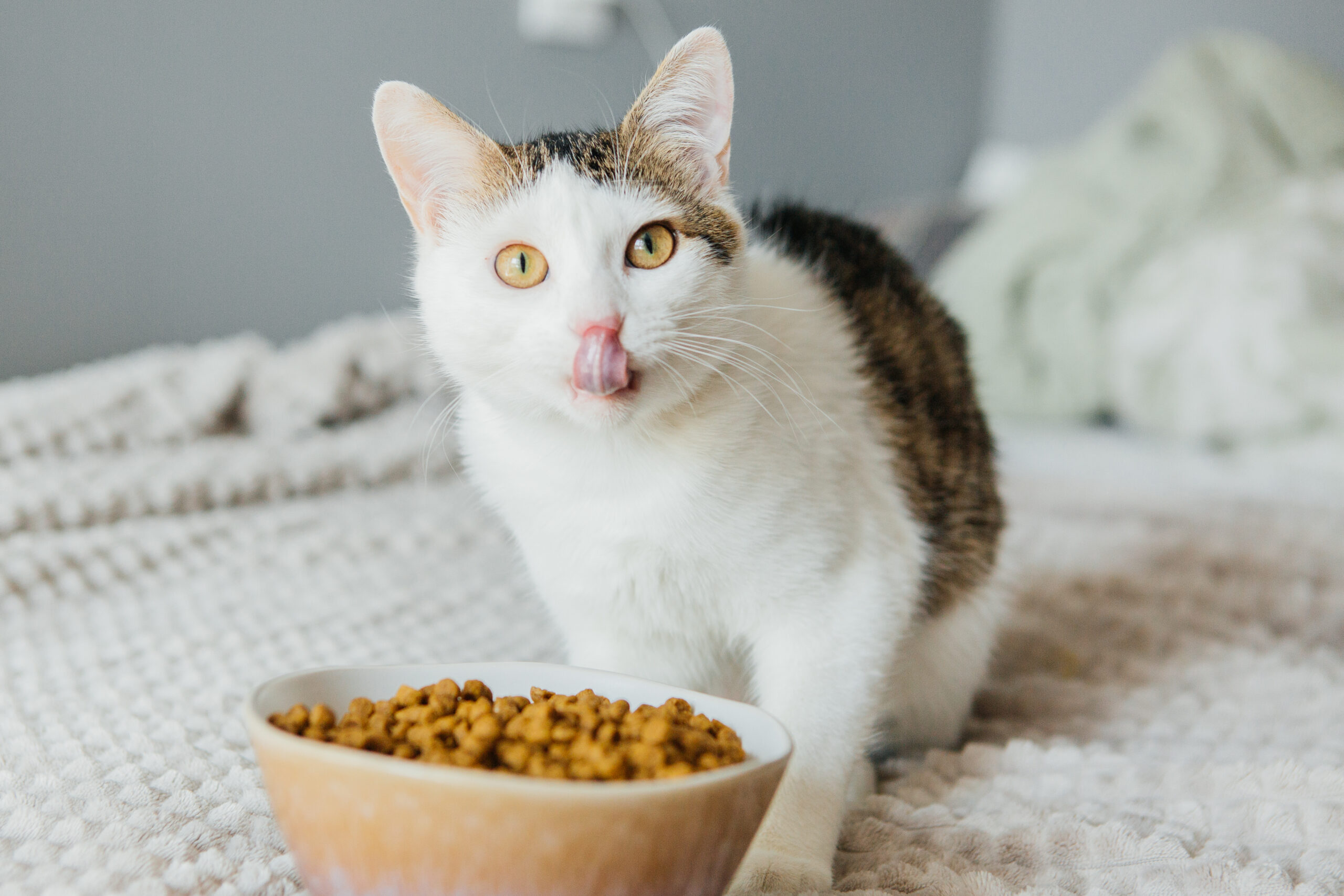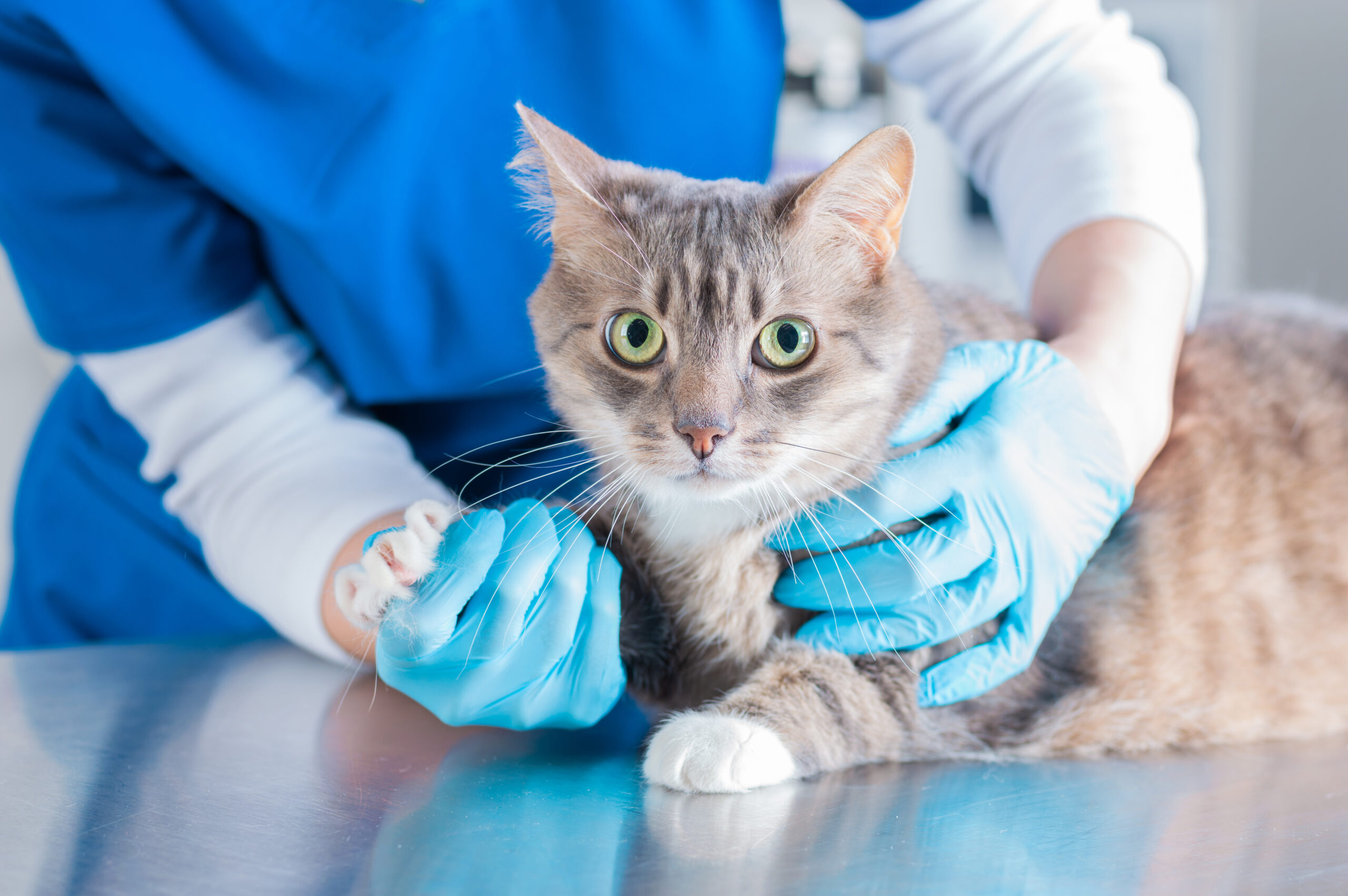We all want our cats to be happy and healthy—but of course, they can’t tell us when they’re not feeling well. That can be frustrating and more than a little stressful.
Still, observant pet parents can watch out for signs and symptoms, and should also keep up with regular veterinary visits. Let’s take a look at some of the things to keep in mind, as well as best practices for ensuring your cat stays healthy.
Identifying signs of illness in a sick cat
While cat illness might be a bit elusive to pin down, there are a few surefire signs you can look for to determine if your cat isn’t feeling well.
Megan McCarthy, DVM, and veterinarian at the Lifesaving Center in Salt Lake City, suggests checking if your cat is:
- Hiding and acting more reclusive
- Has a loss of appetite
- Vomiting
- Losing weight
- Bad breath
- Changes in drinking or urination habits
If you notice any of the following for more than a day or two, follow up with your cat’s veterinarian. The signs listed above can be something as innocuous as an upper respiratory infection—or could signal something more severe, such as cancer. Of course, there’s a whole host of illnesses in between those extremes.
Don’t become “Dr. Google.” If you look up “cancer” or “upper respiratory infection” and your cat has two or more symptoms, or you notice some subtle changes, repeat after us: It doesn’t mean your cat has this disease. A visit to your cat’s veterinarian will more effectively provide answers, and solutions.
While many symptoms of a health issue can stand to be monitored for a day or two before rushing to the vet, if you notice your cat has any difficulty breathing, please do not wait—get to the emergency vet ASAP.

Common cat illnesses, and their symptoms
While vaccines and regular wellness care can keep illnesses at bay, these are just a few of the common diseases and conditions cats can pick up over the course of their lives:
Diabetes
Type II diabetes is the most common type of diabetes in cats, and usually appears in cats who are obese. Here are signs to look for:
- Weight loss
- Excessive thirst
- Increased urination
- Seeming weak and lethargic
- Having an unkempt coat
Treatment includes oral medication, a high-fiber diet, or insulin injections depending on the severity of the illness.
Feline Immunodeficiency Virus (FIV)
FIV is usually passed from one infected cat who bites another. If you have a healthy indoor cat who is vaccinated, this shouldn’t be an issue. But owners of outdoor cats need to be more vigilant, as symptoms do not show up for years after exposure. Here’s what to look for:
- Weight loss
- Unkempt coat
- Lack of appetite
- Diarrhea
- Hair loss
- Discharge from the eyes and/or nose
- Frequent urination and urinating outside of the litter box
- Change in behavior
There is no antiviral treatment for FIV, but can be managed by keeping cats indoors to prevent secondary infections. Prevention is the best option.
Feline Leukemia Virus (FeLV)
This disease affects your cat’s immune system. It’s passed from an infected cat to a healthy one through saliva, nasal secretions, urine, feces, and blood. An infected mother cat can also transmit the disease to her kittens. Often, the disease is passed when a healthy outdoor cat gets into a fight with an infected cat.
A vaccine offers protection from this disease. It’s a preventive measure that is given to your cat before your cat is sick. There is no cure for FeLV.
Symptoms include:
- Weight loss
- Lesions
- Vomiting and diarrhea
- Lethargy
- Pale gums
- Trouble breathing
The best treatment is preventative: Young kittens and cats should be vaccinated against this disease. Keeping your cat indoors and away from infected outdoor cats is also a smart move.
Heartworm
Heartworm is spread by infected mosquitoes, and confusingly, it doesn’t affect your cat’s heart—it actually manifests as a lung disease in felines. Currently, there are no medicines approved to treat heartworm in cats, but there are preventative medications.
Symptoms include:
- Coughing
- Difficulty breathing
- Loss of appetite and sudden weight loss
- Vomiting
- Lethargy
Heartworm is not super common in cats, but it can be fatal. Keep your cats indoors to reduce exposure—are you sensing a theme?—and schedule annual veterinary visits to prevent heartworm.
Ringworm
Don’t let the name fool you, no worms are involved. Ringworm is caused by a fungus that infects your cat’s hair, skin, and claws. It’s highly contagious and may get its name because the symptoms include visible red rings on your cat’s skin. Hair loss is another symptom.
Treatment includes skin ointments and/or oral medications prescribed by your cat’s veterinarian.
Rabies
Transmitted through the bite of an infected animal and through saliva, rabies can be deadly if not treated. Keep your cat indoors away from infected animals. Symptoms include:
- Behavioral changes
- Loss of appetite
- Weakness and disorientation
- Paralysis
- Death
Thanks to vaccines, rabies is no longer a super common illness in cats, but if your cat is infected, the consequences could be devastating.
Not to sound like a broken record, but the best treatment is prevention. Make sure your cat has their rabies shot (it might be required by law where you live). If you suspect your cat was bitten by an infected animal, schedule an immediate veterinary visit for a rabies booster.
Early detection and prevention
You’re a pet parent, not a trained medical professional. Often, being a responsible cat mom or dad simply means maintaining a regular schedule of veterinary care.
“The most important thing you can do to keep your cat healthy is routine veterinary exams every six to 12 months,” McCarthy says. Your veterinarian will perform a full physical, including an oral exam to check your cat’s gums and teeth, and these visits can catch disease processes early.
She also recommends annual blood work at these vet visits and even blood work every 6 months for senior cats to get baselines and catch any problems when early interventions can lead to better prognosis.

Avoid obesity
“One of the best things you can do to ensure your cat stays healthy is keeping them in a lean body condition and avoiding excess body weight and obesity,” McCarthy says.
“Overweight cats are prone to arthritis, organ dysfunction, and diabetes. Feeding your cat twice daily with measured amounts for their ideal body weight will keep them healthy and allow them to live longer, happier lives.”
Your veterinarian can help you calculate your cat’s total required calories needed for their ideal body weight. Use a measuring cup for accuracy. Most adult cats only require a quarter cup of dry kibble twice daily to avoid weight gain.
Keep dental illness at bay
Besides obesity, the most common medical condition veterinarians see in adult cats is dental disease. Signs of dental disease include loose teeth, bad breath, excessive drooling, and loss of appetite.
To keep dental illness from becoming an emergency, it is recommended to have regular veterinary exams performed every 6 to 12 months.
Many young cats develop gingivitis and tartar and require annual dental cleanings to keep their teeth and gums healthy and avoid periodontal disease or stomatitis. If you notice an accumulation of plaque and tartar on your cat’s teeth, schedule a veterinary visit to get those pearly whites cleaned up.
Other cats might pick up on illness before you do
If you have more than one feline in the house, they might actually be the ones to notice something is amiss before you do.
“Some cats can be very aware of changes to their housemate cats, and can notice that something isn’t quite right,” McCarthy says. “If a cat is ill, its housemate may be aware of changes before the owner does. The housemate may become more aggressive towards the cat or it may become more cuddly and affectionate with the cat.”
Maybe cats are just extra empathetic, or maybe there’s a biological explanation—there’s no clear answer.
“We don’t know for sure how cats are able to tell there is something wrong with their housemates,” McCarthy explains. “It may be a scent change, or just a change in behavior too subtle for a human to notice.”
Caring for your cat
We know you only want what’s best for you cat, which is why you might want to get them set up with pet insurance. Pet insurance, like coverage offered by Lemonade can help take the sting out of unexpected vet bills (if they suddenly get sick, for example), plus Lemonade offers a number of preventative packages that help cover routine care like vaccines and wellness checks, and several add-ons that can help cover other issues that might come up over the course of your cat’s life.
Applying for pet insurance is fast, easy, and also kind of fun!





